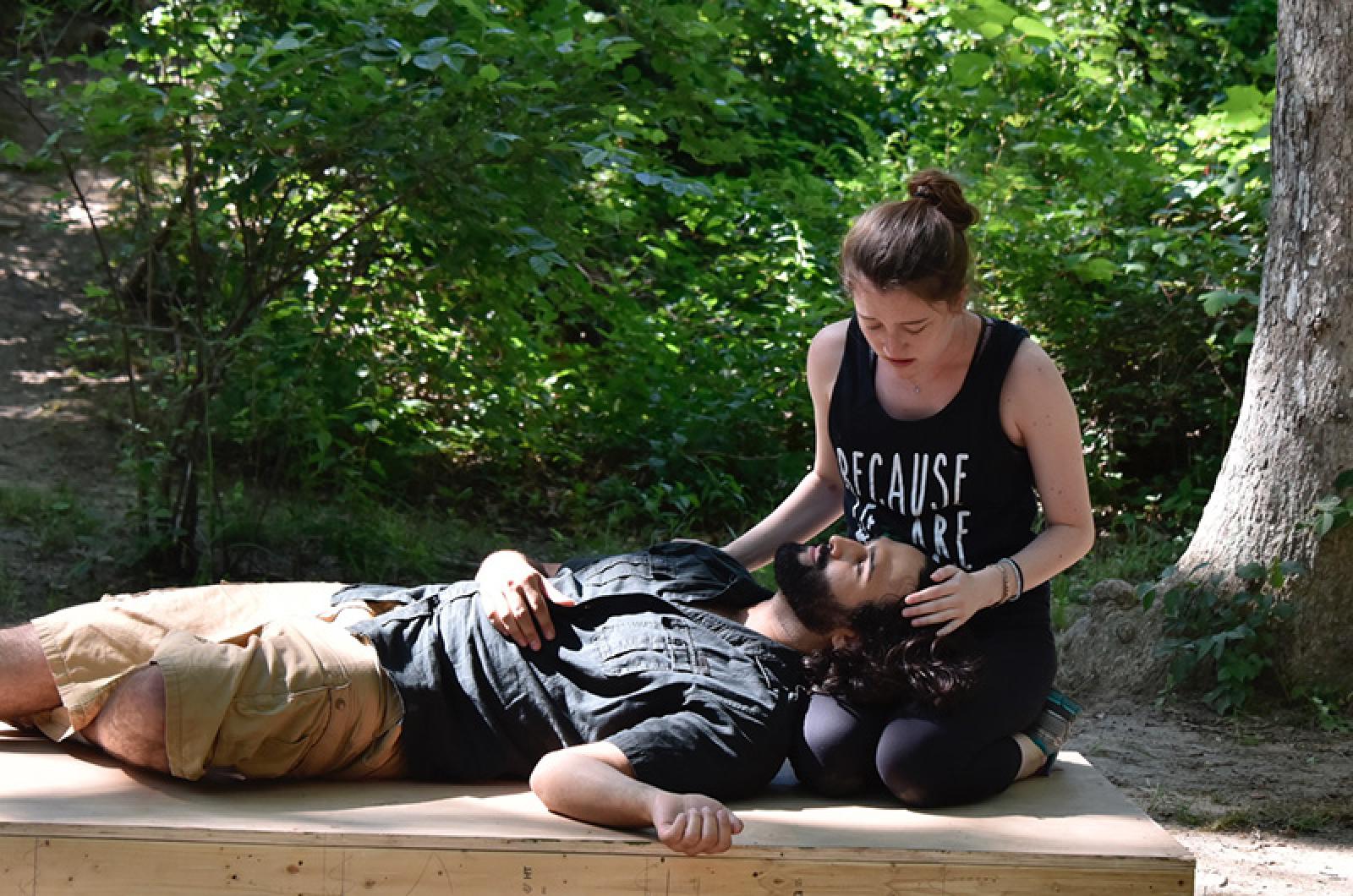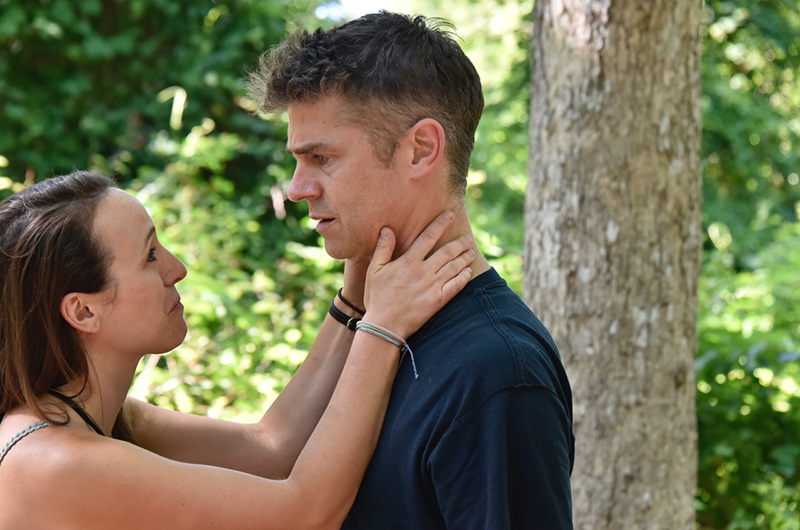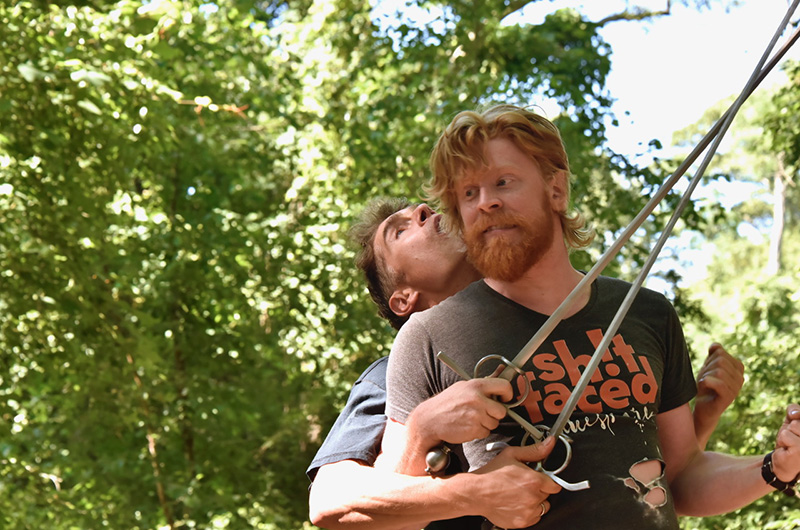Scott Barrow is something of a Shakespeare enthusiast. His first professional show as an actor was as Fabian in Twelfth Night. Since then, he’s performed twice in The Compleat Works of Shakespeare Abridged, directed Henry IV, and done the fight choreography for Julius Caesar. He’s played Roderigo from Othello, Orsino from Twelfth Night, Claudio from Much Ado about Nothing, and Lucentio from The Taming of the Shrew.
On stage, he’s assassinated an emperor, murdered a Montague, courted a Capulet, and replaced poor Nick Bottom’s head with that of an ass. There was one role, however, that remained conspicuously absent from his otherwise extensive Shakespearean repertoire.
“When we heard that Scott had never played Hamlet,” said Brooke Hardman Ditchfield, co-director of this year’s Martha’s Vineyard Playhouse outdoor summer show, “we thought that was a shame. We needed to fix that.”
On July 18, Hamlet opens at the Tisbury Amphitheater, with Scott Barrow playing the titular role. Mr. Barrow, a playhouse veteran, has spent time on the Vineyard since he was a youngster, and has family ties to the Island that go back generations.
“Twenty years ago my first professional shows were in this space,” Mr. Barrow said at the base of the wooded amphitheater, tucked just off the Tashmoo Overlook on State Road. “So this is a theatre I’ve really cut my teeth in.”
On the mainland, he’s had the chance to do shows both on and off Broadway, develop residency programs for students at the Brooklyn Academy of Music, Harvard and Lehigh University, and worked with the award-winning Tectonic Theater Project. But Mr. Barrow’s community, family and, in this case, the opportunity to work with what he calls an all-star cast, continue to draw him to the little theatre in the forest where his career began.
Along with, of course, the chance to play what many consider Shakespeare’s most legendary role.
“It’s a huge responsibility, but also an honor,” Mr. Barrow said.
Part of that responsibility is the baggage that comes with Hamlet itself. The play has over 4,000 lines, of which approximately 1,500 are Hamlet’s alone (that’s almost as long as the entire book for A Comedy of Errors).
“People arrive with such an understanding of what the play is,” Mr. Barrow added. “The most challenging part is making it fresh and relevant but also personal. Not just for the audience, but for me.”
For Mr. Barrow, acquainting himself with a play starts months before he ever reaches a stage. He writes down every quotation, does close readings, and makes a chart he calls ‘he said, she said,’ for every character in the show. And his biggest takeaway after doing this exercise for Hamlet, other than an A-plus in AP English Literature? “Hamlet wins in the end! Who knew!”
“I never realized how dense it was until I started to peel back the onion,” Mr. Barrow continued. “Layer after layer after layer, it holds up in a way that I didn’t really know it did. And I’ve seen the play 21 times.”
The length of the original play and the amount of lines makes the job of co-directors Brooke Hardman Ditchfield and Chelsea McCarthy, both of whom have been friends with Mr. Barrow for over a decade, quite difficult as they had to cut it down to a more manageable time frame.
“For this target length,” explained Ms. McCarthy, “we had to cut almost every other line.”
The pair are still making changes to the script, trying to adapt to the space and cast. “We’re not radical Shakespeare people,” Ms. McCarthy continued. “I’m just as scared of those people as anyone. We cut, we cut, and we cut to try and get to the bones of the thing.”
Of course, that’s not easy when the bones are so well known.
“I’ve never really enjoyed the ‘to be, or not to be’ speech,” admitted Mr. Barrow. “It’s almost like hearing a really good Rolling Stones song, but being introduced to it through a car commercial.”
He prefers the soliloquy, “What a piece of work is man!”
Mr. Barrow gushed about the cast and crew, and Ms. McCarthy and Ms. Hardman Ditchfield expressed similar sentiments. They often can’t start rehearsal because everyone is too busy catching up with each other.
“We all wear four hats,” Ms. McCarthy added.
Jonah Lipsky is playing Horatio and serving as the music director. John Robichau, the play’s Guildenstern, envisioned and designed the frightening puppet they use to depict the ghost. Three other cast members helped him build it.
“There’s not a single person who I haven’t known here for at least a decade,” Ms. McCarthy said. “This is just an embarrassment of riches for this group.”
It’s the space — the Tisbury Amphitheatre — that has brought everyone together. Mr. Barrow sees it as one of the show’s greatest assets.
“It’s very intimate. There’s no lighting, there’s no hiding, there’s barely even any offstage. So in that sense, it’s true to Elizabethan theatre and how the play was written.”
When Polonius mentions yonder cloud in the shape of a camel, audience members won’t see black walls, but blue skies. When Hamlet remarks on the special providence in the fall of a sparrow, bird songs of all kinds will greet their ears.
What excites Mr. Barrow the most, however, are the fight scenes. His graduate degree concentrated on fight choreography, and he’s been working on the sparring for Hamlet with Mac Young, who’s playing Laertes, and puppet-master John Robichau since early May. After Monday’s rehearsal, the three of them became giddy with excitement when Mr. Barrow broke out the swords.
“This is a massive undertaking, and we are all working around the clock,” Mr. Barrow said, in the aftermath of a flourishing parry. Even Mr. Barrow’s six-year-old son, Emmett, likes to get in on the action. “He thinks he’s the assistant fight director.”
“They are ferociously dedicated,” Ms. McCarthy added. “They were dismissed from rehearsal 45 minutes ago, and are still here.”
Of course, Ms. McCarthy, as co-director, won’t let the jovial swordplay last forever. “At the end of the day, they’re gonna have to stop having fun and start killing each other.”
Hamlet opens on July 18 and runs through August 11, Wednesdays through Saturdays, beginning at 5 p.m. each night. True to Elizabethan form, tickets are available at the door, cash only, the day of the performance.







Comments
Comment policy »